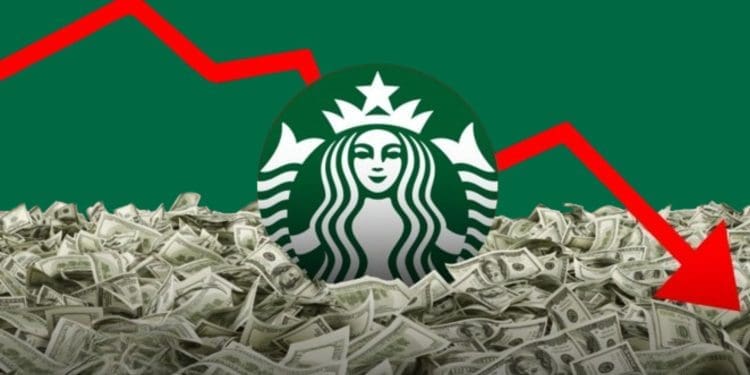- Starbucks has seen its stock price fall sharply in recent weeks due to slower than expected sales growth. Foot traffic and sales are falling short of forecasts.
- Inflationary pressures may be impacting Starbucks’ value proposition, leading some customers to cut back on non-essential purchases. However, Starbucks has raised prices less than competitors.
- While unionization efforts and boycott calls generate headlines, the core issue seems to be sales not meeting Wall Street’s expectations. Investors will watch to see if Starbucks can reaccelerate growth in 2024.
Starbucks has lost $11 billion in market value over the past month. But it’s not because of boycotts. Here’s what’s really happening with the coffee giant.
Slumping Sales Growth
Starbucks is not having a great end to 2023. Its stock price has fallen sharply since November, meaning a $11 billion decline in market value.
Third-party data suggests Starbucks’ sales growth is slower than expected. Foot traffic and sales may be falling short of Wall Street forecasts. It’s not that sales aren’t increasing, it’s that they aren’t increasing as quickly as anticipated.
Some analysts believe Starbucks’ holiday deals and specials aren’t resonating as strongly this year. For example, its annual Red Cup Day saw far less traffic growth compared to 2022.
Inflation’s Impact
Starbucks has raised prices to keep up with inflation and labor costs. But some think its value proposition has suffered, leading customers to cut back on non-essential Starbucks runs. However, the company has increased prices less than competitors.
If consumers finally start tightening their wallets, Starbucks’ high-priced beverages could take a hit. Yet many still view their daily Starbucks as an essential routine.
China Concerns
China is a huge market for Starbucks. Any worries about the Chinese economy negatively impact Starbucks as well. Investors likely have China questions in the back of their minds.
Boycott Calls Not Financially Significant
Despite online calls to boycott Starbucks from both Israel and Palestine supporters, analysts say it’s unclear if these have a real sales impact. Starbucks has survived many prior public controversies.
The calls relate to a deleted pro-Palestine tweet from Starbucks’ union, which the company denounced. But Starbucks has seen various boycotts before, usually without long-term business consequences.
Ongoing Unionization Push
Starbucks remains locked in a contentious battle with workers attempting to unionize. This could negatively sway investor sentiment, as it may hamper sales.
Hundreds of stores have voted to unionize so far. In response, Starbucks has enhanced pay and benefits, changes it hasn’t extended to unionized locations. This push-pull dynamic looks set to continue into 2024.
The Road Ahead
While boycotts and union strife generate headlines, the core issue seems to be sales growth not meeting expectations. As Starbucks closes the books on a rocky 2023, all eyes will be on whether it can reaccelerate growth in the new year.













